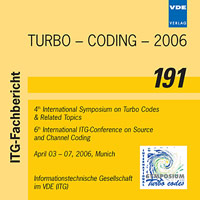OFDM-IDMA versus IDMA with ISI Cancellation for Quasistatic Rayleigh Fading Multipath Channels
Conference: TURBO - CODING - 2006 - 4th International Symposium on Turbo Codes & Related Topics; 6th International ITG-Conference on Source and Channel Coding
04/03/2006 - 04/07/2006 at Munich, Germany
Proceedings: TURBO - CODING - 2006
Pages: 6Language: englishTyp: PDF
Personal VDE Members are entitled to a 10% discount on this title
Authors:
Mahafeno, Irène M.; Langlais, Charlotte; Jego, Christophe (GET/ENST Bretagne/PRACOM, CNRS TAMCIC, Technopôle Brest-Iroise, CS 83818, 29238 Brest Cedex 3, France)
Abstract:
Interleave-Division Multiple Access (IDMA) is a multi-user scheme in which chip interleavers are the only means of user separation. The receiver involves a chip-by-chip iterative multi-user detection. In this paper, we propose a multi-user system combining OFDM and IDMA in the mobile radio environment for the uplink. The OFDM-IDMA performance in terms of bit error rate and complexity is compared with that of IDMA with an Intersymbol Interference Cancellation technique, for quasi-static Rayleigh fading multipath channels. Our results show that the IDMA with Intersymbol Interference Cancellation exploits path diversity in an optimal manner when Inter Symbol Interference (ISI) and Multiple Access Interference (MAI) are perfectly cancelled. Thus, it promises a good performance compared with the OFDM-IDMA when a priori information is perfectly estimated. However, we observe that during the iterative process, the OFDM-IDMA outperforms the IDMA with ISI Cancellation when user numbers increase. Indeed, the increase in the number of users requires the independent processing of MAI and ISI that is carried out in the OFDM-IDMA. Moreover, this study shows that the complexity of IDMA with the ISI Cancellation receiver is about L times that of the OFDM-IDMA, where L is the number of paths.


